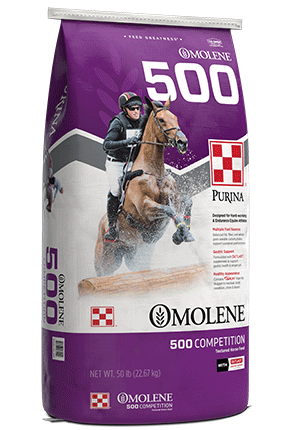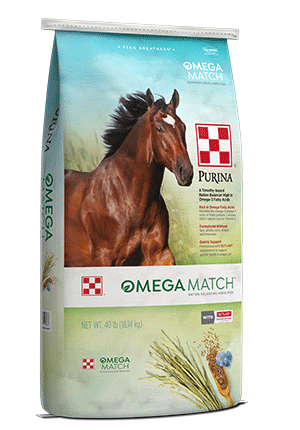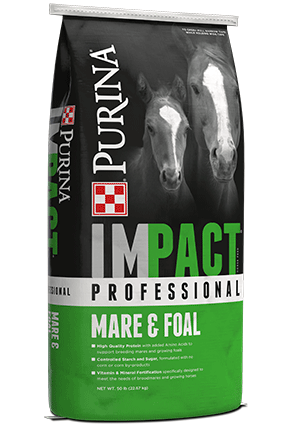
What Should I Feed My Horse Who Was Recently Diagnosed with Cushing’s Disease?
Care : Health Issues

Cushing’s disease, more properly termed pituitary pars intermedia dysfunction (PPID), is a neurodegenerative disorder that leads to the enlargement of a portion of the pituitary gland. This results in excess production of certain peptides and hormones that have a direct effect on the adrenal glands.
How to recognize the signs
Clinical signs include an excessively long hair coat that fails to shed appropriately (hirsutism), poor hair coat, loss of muscle mass, weight loss, lethargy, increased drinking and urination, and recurrent infections. Laminitis may occur in some horses with this condition due to insulin dysregulation or high circulating insulin. PPID can occur in horses ranging from 7 to 40 years in age.
PPID can be very difficult to detect in its’ early stages. Regular wellness exams by a veterinarian and close observation by the horse owner are critical in detecting the early signs of PPID. Because PPID affects multiple body systems, each case is different and it is important to work closely with a veterinarian to develop the optimal plan for managing PPID in the individual horse.
PPID can be very difficult to detect in its’ early stages. Regular wellness exams by a veterinarian and close observation by the horse owner are critical in detecting the early signs of PPID. Because PPID affects multiple body systems, each case is different and it is important to work closely with a veterinarian to develop the optimal plan for managing PPID in the individual horse.
How to feed a horse with PPID
From a nutritional standpoint, horses diagnosed with PPID should be fed a diet that provides excellent quality protein to support muscle mass, adequate calories to support weight maintenance and a proper balance of vitamins and minerals to support all body functions. If the PPID is accompanied by insulin dysregulation, then a lower starch and sugar diet would be warranted. It is recommended to start with a low sugar and starch forage source and in some cases soaking the hay in cold water for 60 minutes or warm water for 30 minutes may be needed to further reduce the starch and sugar content by 20-30%.
With PPID, there is not a one-type-fits-all diet and you must consider the age, weight, activity level, and body condition of the individual horse when determining the right diet, but Purina Animal Nutrition has multiple premium horse feeds that have been successfully fed to horses diagnosed with Cushing’s disease, including but not limited to: Equine Senior®, Equine Senior® Active , WellSolve L/S®, Enrich Plus®, and Omega Match® ration balancer.
WellSolve L/S® - This feed is specifically designed for horses with sensitivities to starch and sugar, like insulin dysregulation, laminitis and PPID. It is guaranteed at 11% maximum starch and sugars, contains no grains or molasses, supports the horse’s health with appropriate vitamins, minerals and protein, as well as biotin to support hoof quality.
Equine Senior® and Equine Senior® Active – Equine Senior® is a complete feed formulated specifically for the aging horse to completely or partially replace the hay or pasture in the horse’s diet when dental problems or missing teeth prevent them from chewing or digesting long-stemmed forage effectively. It is formulated with a blend of fiber sources including beet pulp and top quality hay to help maintain the senior horse’s body condition and support normal digestive function while providing a diet lower in nonstructural carbohydrates that may be suitable for aging horses with carbohydrate sensitivities.
Equine Senior® Active is appropriate for senior horses who can still chew hay well and is low in starch and sugar. Additionally, it includes quality protein and higher calorie levels to support harder keepers or those still working or competing. Both feeds contain ActivAge™ prebiotic, which is scientifically studied in senior horses to support optimal immune function, mobility, and appropriate metabolic response in aging horses.
Enrich Plus® and Omega Match® ration balancers are great options for horses who are overweight or who maintain their weight well on forage alone. They are fed at low rates to meet protein, vitamin and mineral requirements in a low starch and sugar meal without added calories. -.
It is advised that you discuss your feeding program with your veterinarian to determine which specific diet, management and treatment protocol is best for your horse’s condition.
With PPID, there is not a one-type-fits-all diet and you must consider the age, weight, activity level, and body condition of the individual horse when determining the right diet, but Purina Animal Nutrition has multiple premium horse feeds that have been successfully fed to horses diagnosed with Cushing’s disease, including but not limited to: Equine Senior®, Equine Senior® Active , WellSolve L/S®, Enrich Plus®, and Omega Match® ration balancer.
WellSolve L/S® - This feed is specifically designed for horses with sensitivities to starch and sugar, like insulin dysregulation, laminitis and PPID. It is guaranteed at 11% maximum starch and sugars, contains no grains or molasses, supports the horse’s health with appropriate vitamins, minerals and protein, as well as biotin to support hoof quality.
Equine Senior® and Equine Senior® Active – Equine Senior® is a complete feed formulated specifically for the aging horse to completely or partially replace the hay or pasture in the horse’s diet when dental problems or missing teeth prevent them from chewing or digesting long-stemmed forage effectively. It is formulated with a blend of fiber sources including beet pulp and top quality hay to help maintain the senior horse’s body condition and support normal digestive function while providing a diet lower in nonstructural carbohydrates that may be suitable for aging horses with carbohydrate sensitivities.
Equine Senior® Active is appropriate for senior horses who can still chew hay well and is low in starch and sugar. Additionally, it includes quality protein and higher calorie levels to support harder keepers or those still working or competing. Both feeds contain ActivAge™ prebiotic, which is scientifically studied in senior horses to support optimal immune function, mobility, and appropriate metabolic response in aging horses.
Enrich Plus® and Omega Match® ration balancers are great options for horses who are overweight or who maintain their weight well on forage alone. They are fed at low rates to meet protein, vitamin and mineral requirements in a low starch and sugar meal without added calories. -.
It is advised that you discuss your feeding program with your veterinarian to determine which specific diet, management and treatment protocol is best for your horse’s condition.




